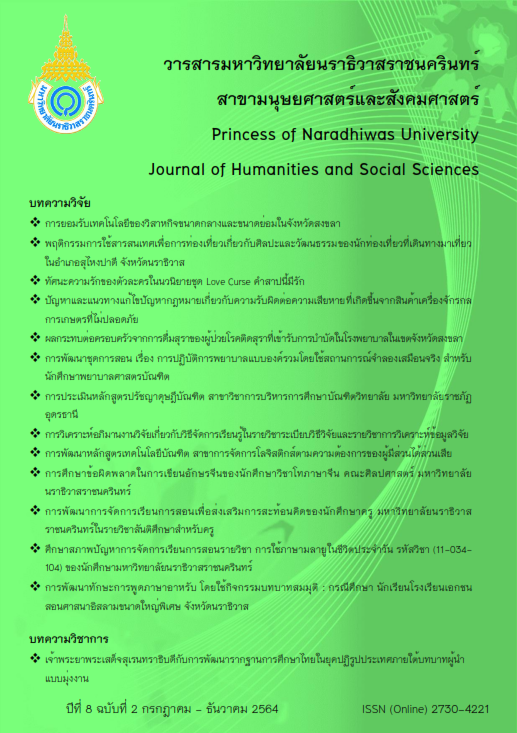The Development of Bachelor of Technology Program in Logistics Management based on Stakeholders’ Requirements
Main Article Content
Abstract
Business dynamics and the growing of logistics manpower demand have forced to produce graduates that meet with the needs of all stakeholders. This research aims to study the characteristics of graduates based on stakeholders’ requirements and to design curriculum structure and courses. This research was conducted by qualitative methods. The data was collected by using in-depth interviews and focus group through semi-structured interviews, along with a voice recording from 12 key informants including managers, supervisors of companies provided domestic and international road transportation and sea freight services, logistics academicians and the final year students of vocational certificate in logistics. A content analysis and data triangulation methods were conducted for data analysis. The results indicated that desirable characteristics of the graduates consisted of 1) knowledge in logistics fields, technology logistics, marketing and service innovation management, management administration and laws in transportation and international trade, 2) skills acquired from practical training in languages, packaged software programs and relevant technologies and 3) attributes which are morals and ethics, social responsibility and adaptation for learning in the workplace. The requirements mentioned above were applied to design curriculum structure and courses including 51 credits for specific requirement courses and 6 credits for free elective courses based on the Dual Vocational Education (DVE) approach.
Article Details
References
กนกกานต์ เทวาพิทักษ์. (2561). การวิเคราะห์ผู้มีส่วนได้ส่วนเสียของมหาวิทยาลัยในกำกับของรัฐ. วารสารบริหารศาสตร์ มหาวิทยาลัยอุบลราชธานี, 7(13). 88-108.
กฤตภาส อารีรักษ์ และทวีศักดิ์ กฤษเจริญ. (2557). สมรรถนะที่พึงประสงค์ของผู้ปฏิบัติการในส่วนของคลังสินค้าของบริษัทไปรษณีย์ไทย จำกัด เพื่อเตรียมความพร้อมรองรับการเข้าสู่ประชาคมเศรษฐกิจอาเซียน. วารสารสังคมศาสตร์ มหาวิทยาลัยศรีนครินทร์วิโรฒ. 17(มกราคม -ธันวาคม 2557) 10-29.
ณรงค์ โมกขวิสุทธิ์ และ ณัฏฐพันธ์ เขจรนันทน์. (2558). การประยุกต์แนวคิดเชิงธุรกิจในการบริหาร และพัฒนาหลักสูตรระดับบัณฑิตศึกษาด้านโลจิสติกส์ เพื่อรองรับการพัฒนา และบูรณาการทางเศรษฐกิจไทยในการเข้าร่วม AEC. วารสารบัณฑิตวิทยาลัย มหาวิทยาลัยราชภัฏสวนดุสิต, 11(3), 33-43.
บุษกร เชี่ยวจินดากานต์. (2561). เทคนิคการวิจัยเชิงคุณภาพแบบกรณีศึกษา. วารสารศิลปะศาสตร์ปริทัศน์, 13(25), 103-118.
พสิษฐ์ ศักดิ์วานิชกุล และ เกิดศิริ เจริญวิศาล. (2563). การศึกษาประสิทธิภาพการให้บริการ โลจิสติกส์สำหรับงานแสดงสินค้า ประเภทเครื่องจักรกล และเทคโนโลยีโลหะการ. วารสารวิทยาลัยดุสิตธานี, 14(2), 290-306.
เพ็ญศิริ โฉมกาย สมศิริ สิงห์ลพ และ ปริญญา ทองสอน. (2562). การพัฒนาหลักสูตรฐานสมรรถนะด้านคุณลักษณะของบัณฑิตนักปฏิบัติ มหาวิทยาลัยเทคโนโลยีราชมงคลตะวันออก. วารสารศึกษาศาสตร์ มหาวิทยาลัยนเรศวร, 21(2),189-200.
ภาณุมาศ เนียมพลับ และ สุรมงคล นิ่มจิตต์. (2562). สมรรถนะของเจ้าหน้าที่จัดการคลังสินค้าที่ตรงกับความต้องการของตลาดแรงงานในภาคอุตสาหกรรมธุรกิจการขนส่งสินค้าทางอากาศ. วารสารวิจัยราชภัฏกรุงเก่า, 6(2), 1-7.
มารุต พัฒผล. (2562). การประเมินหลักสูตรเพื่อการเรียนรู้และพัฒนา. (พิมพ์ครั้งที่ 4). กรุงเทพฯ: จรัญสนิทวงศ์การพิมพ์.
เลิศชาย ศิริชัย. (2539). การวิจัยเชิงคุณภาพ ทำไมและอย่างไร. วารสารสุทธิปริทัศน์. 10(30), 32-47.
สุชาติ ประสิทธิ์รัฐสินธุ์ และ กรรณิการ์ สุขเกษม. (2551). วิธีวิทยาการวิจัยเชิงคุณภาพ: การวิจัยปัญหาปัจจุบันและการวิจัยอนาคตกาล. (พิมพ์ครั้งที่ 2). กรุงเทพฯ: สามลดา.
สำนักงานสภาพัฒนาการเศรษฐกิจและสังคมแห่งชาติ. (2563). รายงานโลจิสติกส์ของประเทศไทยประจำปี 2562. สืบค้น 5 มกราคม 2564, เข้าถึงได้จาก https://www.nesdc.go.Th/ewt_dl_ link.php?nid=10791
อนุวัต สงสม. (2563). สมรรถนะของบัณฑิตสาขาวิชาการค้าสมัยใหม่และนวัตกรรมบริการตามความต้องการของนายจ้าง. ในการประชุมวิชาการระดับชาตินนทรีอีสาน ครั้งที่ 8 KUCSC National Conference, Innovation and Technology for Quality of Life and Sustainable Society: มหาวิทยาลัย เกษตรศาสตร์ วิทยาเขตเฉลิมพระเกียรติ, จังหวัดสกลนคร.
อรณิชา บุตรพรหม. (2559). คุณลักษณะบุคลากรด้านโลจิสติกส์ที่องก์การเอกชนต้องการ กรณีศึกษา : ผู้ประกอบการในเขตนิคมอุตสาหกรรม จังหวัดปราจีนบุรี. วารสารราชภัฎเพชรบูรณ์, 18(1), 67-80.
อโณทัย งามวิชัยกิจ. (2559). การพัฒนาสมรรถนะอาชีพในสายงานการจัดการขนส่งระหว่างประเทศของไทย. วารสารการจัดการสมัยใหม่, 13(2), 77-92.
Khanna, R., Lele, G., Anandakrishna, L., Deshpande, A., Mathur, V. P., Mathu, M., Marwah, N. (2021). Development of a Competency-Based Curriculum for Undergraduate Education in Pediatric Dentistry: A Systematic Approach. Medical Journal Armed Forces India, 77(1) 22-30.
Sittiwong, T. (2019). Curriculum development, logistics and supply chain: Project Incubator and the development of integrated logistics and supply chain under the reform program of the National Curriculum, International Journal of Humanities and Social Science, 9(1). 9-16.
Woschank, M. & Pacher, C. (2020). Program Planning in the Context of Industrial Logistics Engineering Education. Procedia Manufacturing, 51(1). 1819-1824.


